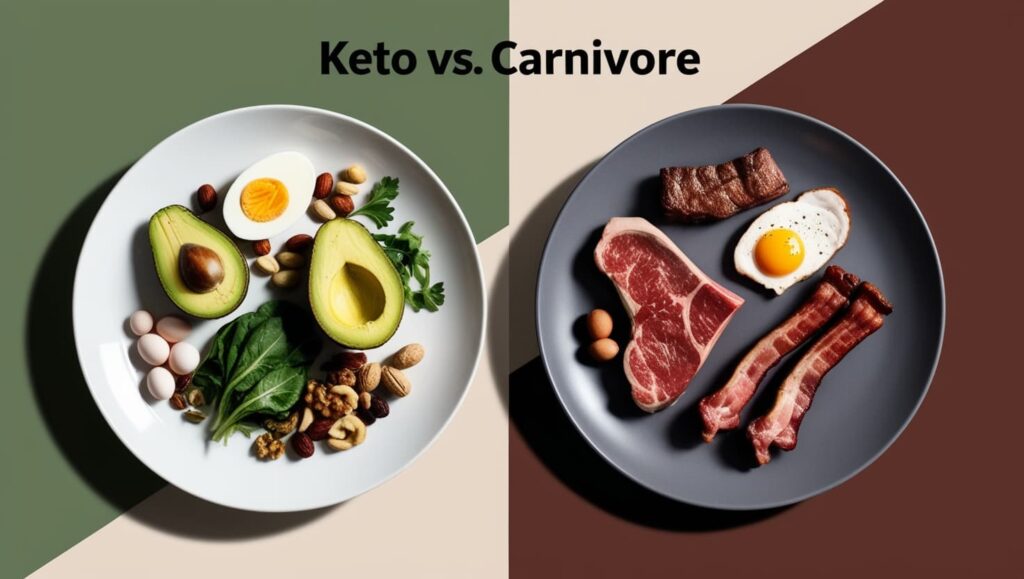Table of Contents
ToggleImagine a world where bacon is a health food and bread is taboo. Welcome to the realm of low-carb diets, where the ketogenic and carnivore diets reign supreme. But which one is the true champion of health and weight loss? Buckle up as we dive into the meaty details of these popular eating plans.
The Low-Carb Revolution: Keto vs Carnivore
In recent years, low-carb diets have taken the nutrition world by storm. Among these, the ketogenic (keto) and carnivore diets have emerged as powerful contenders, each with its own loyal following. But what sets these diets apart, and how do you choose between them? Let’s break it down.
What is the Ketogenic Diet?

The ketogenic diet, often shortened to “keto,” is a high-fat, moderate-protein, and very low-carbohydrate eating plan. Its primary goal is to shift your body’s metabolism from burning glucose for energy to burning fat, a state known as ketosis.
Key Features of the Keto Diet:
- Macronutrient Ratio: Typically 70-75% fat, 20-25% protein, and 5-10% carbohydrates
- Carb Restriction: Usually limited to 20-50 grams per day
- Food Choices: Includes meat, fish, eggs, dairy, nuts, seeds, and low-carb vegetables
- Duration: Can be followed long-term with proper planning and monitoring
The Carnivore Diet: Meat, the Whole Meat, and Nothing But the Meat
The carnivore diet, as the name suggests, is an all-animal-product diet. It’s the ultimate elimination diet, removing all plant foods from the menu.
Key Features of the Carnivore Diet:
- Macronutrient Ratio: Primarily protein and fat, with virtually zero carbohydrates
- Food Choices: Limited to meat, fish, eggs, and sometimes dairy
- Elimination: Excludes all plant foods, including fruits, vegetables, grains, and legumes
- Duration: Often used as a short-term elimination diet, though some follow it long-term
Keto vs Carnivore: The Similarities

Before we dive into the differences, let’s look at what these diets have in common:
- Low-Carb Approach: Both diets significantly restrict carbohydrate intake.
- High Fat Content: Both diets encourage consumption of high-fat foods.
- Potential for Weight Loss: Many followers report rapid weight loss on both diets.
- Emphasis on Whole Foods: Both diets discourage processed foods and emphasize whole, unprocessed options.
Keto vs Carnivore: The Key Differences
Now, let’s explore the main differences between these two popular diets:
1. Food Variety
Keto: Offers a wider range of food choices, including vegetables, nuts, seeds, and some fruits in moderation.
Carnivore: Extremely restrictive, limited to animal products only.
2. Nutrient Profile
Keto: Can provide a more balanced nutrient profile when properly planned, including vitamins and minerals from low-carb vegetables.
Carnivore: May lead to deficiencies in certain vitamins and minerals typically obtained from plant foods.
3. Fiber Content
Keto: Includes some fiber from low-carb vegetables and seeds.
Carnivore: Contains no dietary fiber, which may impact digestive health.
4. Ketosis
Keto: Specifically designed to induce and maintain a state of ketosis.
Carnivore: May or may not lead to ketosis, depending on the individual’s protein intake and metabolism.
5. Protein Intake
Keto: Moderate protein intake to maintain ketosis.
Carnivore: High protein intake, which may interfere with ketosis in some individuals.
The Science Behind Keto and Carnivore Diets
Both the ketogenic and carnivore diets have garnered attention from researchers, though long-term studies are still limited. Let’s examine the current scientific understanding of these diets.
Ketogenic Diet Research
- Weight Loss: Numerous studies have shown that the ketogenic diet can lead to significant weight loss, often more rapidly than traditional low-fat diets.
- Metabolic Health: Research suggests that the keto diet may improve insulin sensitivity and reduce risk factors for heart disease, such as high blood pressure and triglycerides.
- Neurological Benefits: Some studies indicate potential benefits for neurological conditions like epilepsy, Alzheimer’s disease, and Parkinson’s disease.
- Cancer: Preliminary research suggests that the keto diet may have potential as an adjunct therapy in certain types of cancer treatment.
Carnivore Diet Research
- Limited Studies: The carnivore diet has less scientific backing compared to the ketogenic diet, with fewer formal studies conducted.
- Anecdotal Evidence: Many followers report improvements in autoimmune conditions, digestive issues, and mental clarity.
- Nutrient Concerns: Nutritionists express concern about potential nutrient deficiencies due to the elimination of all plant foods.
- Long-Term Effects: The long-term effects of following a carnivore diet are not well understood and require further research.
Potential Benefits of Keto and Carnivore Diets

Both diets have their proponents who claim various health benefits. Let’s explore some of these potential advantages:
Ketogenic Diet Benefits:
- Weight Loss: Many people experience rapid weight loss on the keto diet.
- Blood Sugar Control: May improve insulin sensitivity and help manage type 2 diabetes.
- Improved Mental Clarity: Some report enhanced cognitive function and focus.
- Reduced Inflammation: May help reduce inflammation in the body.
- Increased Energy: After the initial adaptation period, many report sustained energy levels.
Carnivore Diet Benefits:
- Simplicity: The diet is straightforward and easy to follow.
- Elimination of Potential Allergens: Removes all plant-based foods that may cause allergies or sensitivities.
- Digestive Relief: Some report improved digestive symptoms, particularly those with IBS or other gut issues.
- Potential Autoimmune Benefits: Anecdotal reports suggest improvements in autoimmune conditions.
- Satiety: High protein and fat intake can lead to increased feelings of fullness.
Potential Drawbacks and Risks
While both diets have their advantages, they also come with potential risks and drawbacks that should be considered:
Ketogenic Diet Drawbacks:
- Keto Flu: Initial adaptation period can cause flu-like symptoms.
- Nutrient Deficiencies: If not properly planned, may lead to deficiencies in certain vitamins and minerals.
- Difficult to Maintain: The strict carb limitation can be challenging for some to follow long-term.
- Potential Liver and Kidney Stress: High fat intake may stress these organs in some individuals.
- Impact on Athletic Performance: May initially decrease performance in high-intensity activities.
Carnivore Diet Drawbacks:
- Extremely Restrictive: Eliminates entire food groups, which can be challenging and potentially unhealthy long-term.
- Nutrient Deficiencies: High risk of deficiencies in vitamins C, E, K, and various minerals.
- Lack of Fiber: May lead to digestive issues and changes in gut microbiome.
- Potential Cardiovascular Risks: High intake of saturated fat may increase heart disease risk in some individuals.
- Social Challenges: Can be difficult to follow in social situations or when dining out.
Who Should Consider Keto vs Carnivore?

Choosing between these diets depends on individual health goals, preferences, and medical conditions. Here’s a general guide:
Consider Keto If:
- You want to lose weight while maintaining some dietary variety
- You’re looking to improve blood sugar control
- You’re interested in potential cognitive benefits
- You’re willing to track macros and plan meals carefully
Consider Carnivore If:
- You have severe food allergies or sensitivities to plant foods
- You’re looking for an extreme elimination diet to identify food intolerances
- You prefer a simple, straightforward eating plan
- You’re willing to closely monitor your health and nutrient intake
Important Considerations Before Starting
Before embarking on either the keto or carnivore diet, it’s crucial to:
- Consult a Healthcare Professional: Discuss your plans with a doctor or registered dietitian, especially if you have any pre-existing health conditions.
- Understand the Commitment: Both diets require significant lifestyle changes and careful planning.
- Monitor Your Health: Regular check-ups and blood tests can help ensure you’re not developing any nutritional deficiencies or health issues.
- Plan for Sustainability: Consider whether you can maintain the diet long-term and how it fits into your lifestyle.
- Be Prepared for Side Effects: Both diets can cause initial side effects as your body adapts to the new eating pattern.
Conclusion: Making the Right Choice for You
The debate between keto and carnivore diets is not about crowning a universal winner, but about finding the approach that best suits your individual needs and goals. Both diets offer potential benefits, but they also come with risks and challenges.
The ketogenic diet provides more flexibility and a potentially more balanced nutrient profile, making it a more sustainable option for many. The carnivore diet, while more restrictive, may offer benefits for those with severe food sensitivities or specific health conditions.
Ultimately, the best diet is one that you can stick to long-term while meeting your nutritional needs and supporting your overall health. Whether you choose keto, carnivore, or another eating plan entirely, remember that individual results may vary, and it’s essential to listen to your body and work closely with healthcare professionals.
As our understanding of nutrition continues to evolve, so too will our approaches to optimal eating. Stay informed, be adaptable, and always prioritize your health and well-being above any dietary trend.
FAQs About Keto vs Carnivore
Can I lose weight faster on the carnivore diet compared to keto?
Weight loss results can vary greatly between individuals. While some may lose weight more rapidly on the carnivore diet due to its restrictive nature, the ketogenic diet has more scientific backing for sustainable weight loss.
Are there any long-term studies on the safety of the carnivore diet?
Currently, there are no long-term studies specifically on the carnivore diet. Most evidence is anecdotal, and more research is needed to understand its long-term effects.
Can I exercise effectively on the keto or carnivore diet?
Many people can exercise effectively on both diets after an adaptation period. However, high-intensity performance may be impacted, especially initially. It’s important to listen to your body and adjust as needed.
Is it possible to get all necessary nutrients on the carnivore diet?
While the carnivore diet can provide many essential nutrients, it’s challenging to obtain all required vitamins and minerals without any plant foods. Careful planning and possibly supplementation may be necessary.
Which diet is better for managing diabetes: keto or carnivore?
The ketogenic diet has been more extensively studied for diabetes management and has shown promising results in improving insulin sensitivity. However, individual responses may vary, and it’s crucial to work with a healthcare provider to manage diabetes.





